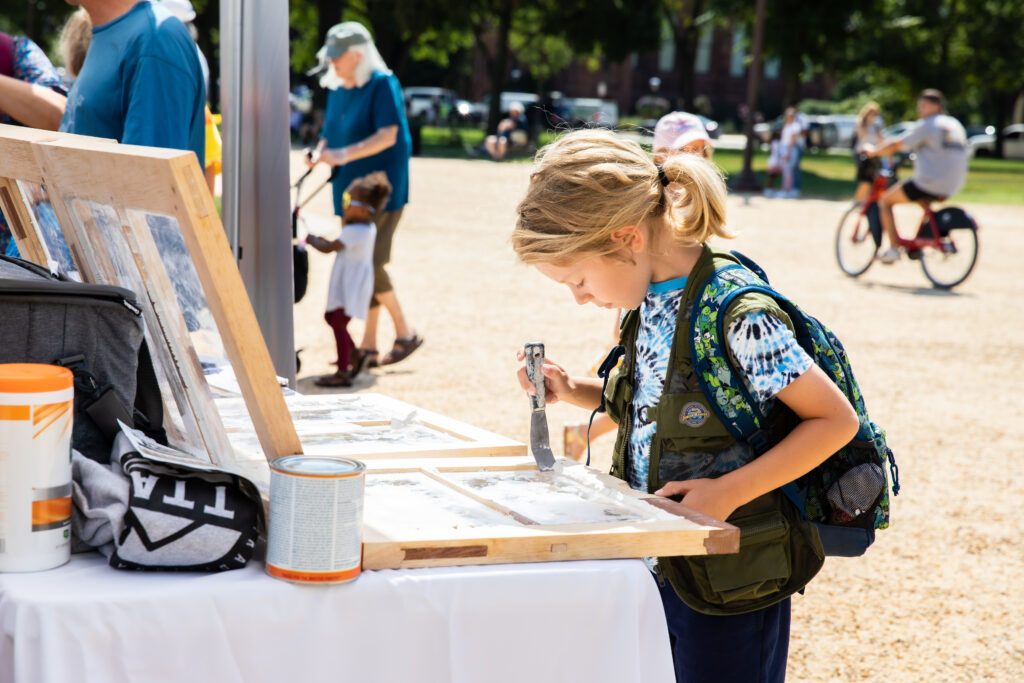2023 marks 90 years since the Civilian Conservation Corps, a depression-era relief program, was established. The anniversary provides an opportunity to reflect on the power of service – and the opportunity before us to make Maryland a leader in 21st century service.
In March of 1933, in one of his first acts in office, then President Franklin Delano Roosevelt proposed the creation of the new program, the Civilian Conservation Corps (CCC), which he explained would be, “used in simple work . . . More important, however, than the material gains will be the moral and spiritual value of such work.” The Civilian Conservation Corps, or CCC, was officially established with an executive order on April 5, 1933.

President Roosevelt meets the first company of the CCC, 1933. (FDR Library)
The work of the new Corps was anything but simple in its scale and impact. Over the course of its 9-year lifespan, the CCC established some 4,000 camps for corps members in every state and territory where more than 3 million individuals eventually served in the “Tree Army.”
During their service, the boys of the CCC physically supported conservation efforts around the nation. The enrollees replanted and maintained forests, developed state and national parks, restored historic structures, built numerous structures to support recreation and camping, and helped curtail flooding. Here in Maryland, some 30,000 corps members served and their impact is still felt across the state in some of our most iconic and beloved parks, trails and forests.

Catoctin Mountain Park, 1936. Site of a CCC camp. (NPS)
However, as President Roosevelt explained, it wasn’t just about the work – the effort also brought together Americans from various walks of life under the banner of service. The experience provided the members a small paycheck, free healthcare, lodging, clothing, and food and the dignity of work during a period of vast unemployment.
For as much as the CCC got right – there were undoubtedly missteps and missed opportunities. CCC camps were for men only and efforts to establish a sister agency for women was largely unsuccessful. The camps were also segregated along color lines – a distasteful reminder of the period of “separate but equal” in which the CCC operated.

CCC–Third Corps Area (PA, MD, VA, DC), Classes in Brick Masonry, Companies. (FDR Presidential Library)
Nonetheless, the overall impact of the CCC was exceptionally positive. It transformed America’s conservation landscape and gave a generation of young men a sense of pride about their nation. It also prepared these young men for the coming storm of war that would ultimately result in the Corps undoing and where many former members would serve again in uniform.
In post-WWII America, a new generation of conservation corps emerged based on the legacy of the CCC – but this new corps model was far more inclusive – engaging enrollees from all walks of life. Yet, for all it got right, some of have suggested that the new Corps programs also lack the universality of the CCC – and the camaraderie developed by living together in camps, in uniform, collectively pulling towards a common goal. Many have continued to argue for a return to that version of service.
The Future of Service
Today, Maryland is poised to revive service, at a level not seen since perhaps the CCC, through Governor Moore’s proposal to establish a Service Year for every graduate of a Maryland high school. Where other programs have been timid in scale and scope – this new program has the potential to rise to the level of universality enjoyed by the CCC. Equally valuable is the potential for this type of 21st century service program to help enrollees to see the commonality to the experience of being a Marylander – that those from rural, urban, and suburban communities share similar hopes, dreams, challenges, and barriers. Service is a powerful tool for reducing the static of partisanship and building enduring fellowship.

Campaign for Historic Trades event, 2021.
Preservation Maryland is a vocal supporter of this new service year option – not only because it’s good for the people of Maryland – but because there is a unique opportunity to engage young adults in service through historic trades’ training in our state parks. Just like the CCC, these young service members could help to restore and invest in places that matter and learn valuable skills and launch a career in the process.

